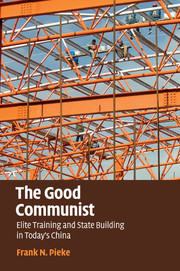Book contents
- Frontmatter
- Contents
- List of illustrations
- Preface
- Map 1 The People's Republic of China
- Map 2 Yunnan Province
- 1 Socialism, capitalism and the anthropology of neo-socialist rule
- 2 Cadres, cadre training and party schools
- 3 Cadre training and education in the twenty-first century
- 4 Life and work at party schools
- 5 Marketization and centralization of cadre education and training
- 6 Cadre training, cadre careers and the changing composition of China's political elite
- 7 Conclusions: cadre training and the future of party rule
- Appendix 1 List of interviewees
- Appendix 2 Student questionnaire survey
- Appendix 3 Glossary of Chinese terms
- References
- Index
- References
2 - Cadres, cadre training and party schools
Published online by Cambridge University Press: 29 March 2010
- Frontmatter
- Contents
- List of illustrations
- Preface
- Map 1 The People's Republic of China
- Map 2 Yunnan Province
- 1 Socialism, capitalism and the anthropology of neo-socialist rule
- 2 Cadres, cadre training and party schools
- 3 Cadre training and education in the twenty-first century
- 4 Life and work at party schools
- 5 Marketization and centralization of cadre education and training
- 6 Cadre training, cadre careers and the changing composition of China's political elite
- 7 Conclusions: cadre training and the future of party rule
- Appendix 1 List of interviewees
- Appendix 2 Student questionnaire survey
- Appendix 3 Glossary of Chinese terms
- References
- Index
- References
Summary
SOCIALIST GOVERNANCE
The Communist Party's dominance in China amounts to much more than simply holding on to power. In Soviet and Chinese communist political theory, the Communist Party is intimately linked to, but remains separate from, the government. The party does not govern, but leads, directs, controls and inspires all institutions of governance: state, army, judiciary, mass organizations, ‘functional’ work units, state enterprises. The party even guides, mainly through its United Front Department (Tongzhan Bu), the formal institutions of representative government, such as the people's congresses and the people's consultative conferences. In addition to having its own separate organizational setup, the party has created cells of party members in institutions everywhere, ensuring the party's role as the leading force that holds society together. With only slight exaggeration we can indeed say that the party is ‘the organized expression of the will of the dominant class in society, the proletariat’ (Schurmann 1968: 109). This role is predicated on socialist ideology as a mode of governance. Without such an ideology, the party would quickly decay into an electoral machine or a patronage network for the competition and sharing of power: effective perhaps at just that, but no longer a party capable of exercising leadership across society.
- Type
- Chapter
- Information
- The Good CommunistElite Training and State Building in Today's China, pp. 26 - 55Publisher: Cambridge University PressPrint publication year: 2009



